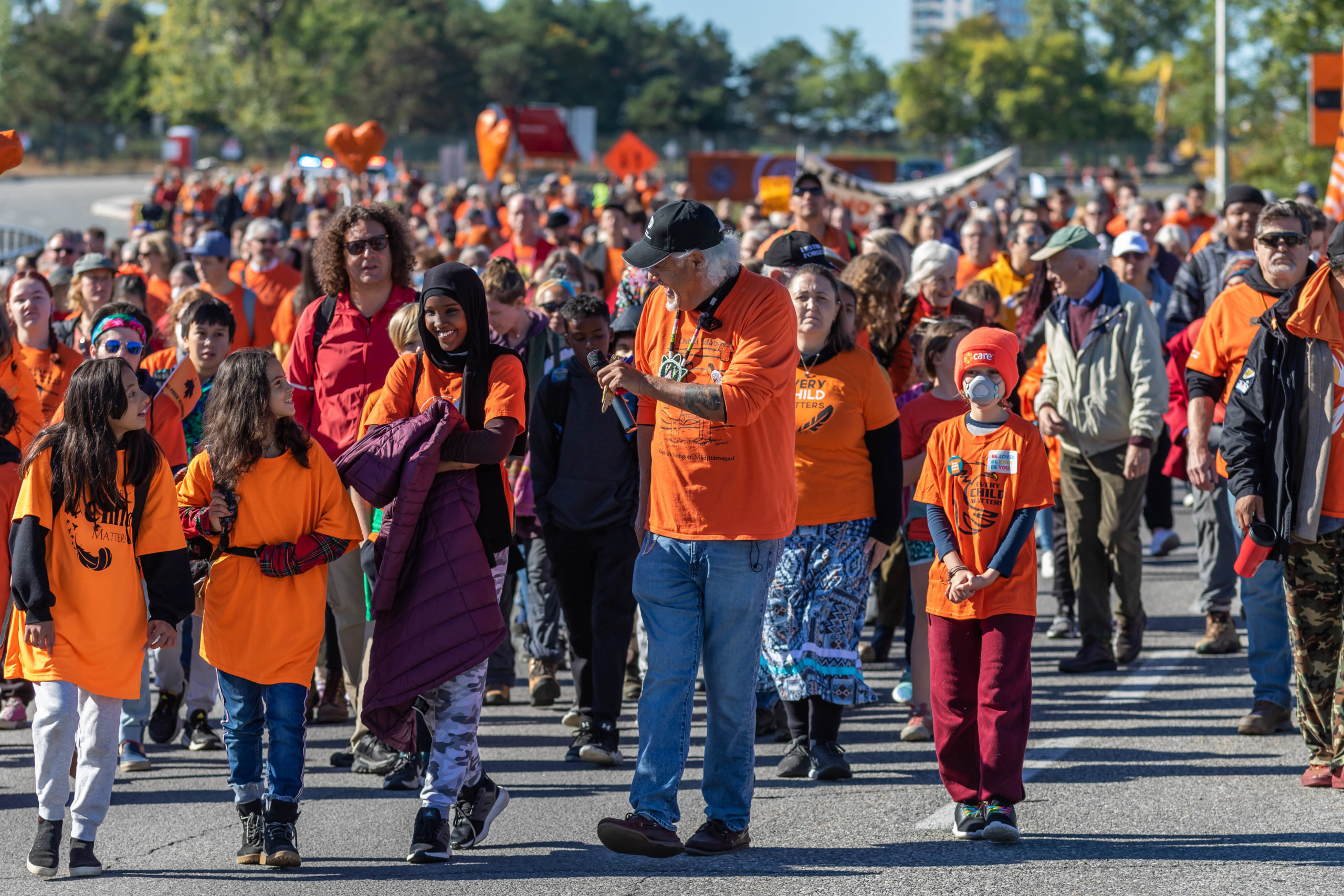On the morning of Sept. 30, Albert Dumont, an activist, Algonquin traditional teacher, and Ottawa’s current English poet laureate led a protest walk calling for the name of the Sir John A. Macdonald Parkway to be changed.
The sign for the name of the parkway was covered with an orange Every Child Matters banner and hundreds of protestors joined Dumont walking down one lane of the parkway as it follows the Ottawa river from the War Museum to Parkdale. On the other side of the sign was the suggestion for a new name Kichi Zibi Parkway/Promenade, the Algonquin Anishnaabe name for the Ottawa River, which the parkway follows.
The parkway was renamed to honour Sir John A. Macdonald, Canada’s first prime minister, in 2012.
Dumont and the protestors want that honour revoked because Macdonald’s government established the system of Indian Residential Schools with the intent to assimilate all of the children into white, European culture. Children were forcibly removed from their families and communities and forced to attend schools where they were forbidden to speak their own languages, often suffered from malnutrition, and many suffered physical, emotional and sexual abuse. In the final report of the Truth and Reconciliation Commission the system was deemed to be cultural genocide.
“Imagine living in a world where your children were taken from you by force and taken far away from you. Imagine what would be going on in your mind and in your heart. ‘Is my child safe? What’s happening to my child?’ Imagine the tears. You couldn’t count the tears,” Dumont said during the walk. “When I think of my grandchildren, only over my dead body would I allow anyone to take them from me. And more and more Canadians are understanding about the cruelty and viciousness of the architect of genocide, John A. Macdonald.”
Macdonald’s government ignored a 1907 report from Dr. Peter Bryce, who was the chief medical health inspector for the department of Indian Affairs, that said that underfunding, inadequate sanitation, poor ventilation and overcrowding in the schools was leading to outbreaks of disease and a death rate of 50 percent. Bryce finally published the report he titled “A National Crime” himself in 1922.
In his book Clearing the Plains, historian James Daschuk has also detailed how the Macdonald government withheld food during a famine in order to force Indigenous people on to reserves.
Macdonald’s government also introduced a pass system that meant that Indigenous people had to obtain a written pass from the local Indian agent in order to leave the reserve.
“The National Capital Commission didn’t want to give us a permit to walk today,” Dumont told those in the march. “The pass system ended in the 1950s when Indigenous people needed a pass to walk. John A Macdonald the policies and laws that he created pretty much paralyzed the Indigenous people of those times, but our muscles are coming back. We are able to walk and to stand up for our rights.”
Dumont added, “We are a people of peace, and we will do things peacefully…. It’s good to be in solidarity with you and to be in solidarity with these trees and with this river, the energy of the sun, the wind, the human heart, the human spirit.” He pointed to a hawk perched in a tree not far from where the walk paused by the covered parkway sign. “That means so much to me,” he said.
Bishop Shane Parker and several members of the clergy in Anglican diocese of Ottawa were with walking with Dumont, who is also Algonquin advisor to the bishop. Dumont asked the bishop if he would share his thoughts with those on the walk.
“Peace be with you all. My voice doesn’t matter today. I’m part of a church, which was part of the egregious colonial engine that participated in residential schools,” Bishop Parker began. “Everything changed for the Anglican Church of Canada when it began to listen. It became silent and began to listen to the voices of those who suffered horrific abuse, from the instruments of genocide in schools and we listened to those voices.”
He recounted how Archbishop Michael Peers issued the first of the Anglican Church’s two official apologies to Indigenous peoples about 30 years ago. “The first apology was for the incredible harm caused by residential schools. The archbishop said we tried to remake you in our own image. That is a crime, that is theft. My church was arrogant enough to think that Creator was not on this land before Europeans came here. That is blasphemous,” Bishop Parker said. “And so my church went from being a perpetrator to being a reconciler, and that’s a journey many non-Indigenous people have to take and to own,” said the bishop. “And so today, the only voices that matter, especially on this place, are the voices of the Anishnaabe Algonquin, … and the voices of the children who were taken forcibly, without the consent of their parents, and stripped of their identity, their fundamental core identity. Those are the voices we must listen to, especially those that cannot be spoken to us on this earth at this time but cry to us from the Spirit World.” At this, the walkers observed a moment of silence for the children.
Dumont also asked his granddaughter, Kyrstin Dumont, to address the crowd.
“There should be no pride in genocide, no pride in the name John A. Macdonald,” she began.
Although Macdonald and the residential schools caused intergenerational trauma, she pointed to the intergenerational strength and love that is evident among Indigenous peoples.
“For the survivors to be here today, for the youth, knowledge keepers, to be here to walk on this parkway in solidarity, in resilience, that is intergenerational strength, the same intergenerational strength that my grandfather has passed down to me, and that I hope to pass down to my future children. Because if we don’t acknowledge the strength that we hold within us, how can we still be thriving and striving as Indigenous people within a colonial society that we still live in today?” she asked.
“When I woke up this morning, I wasn’t sure what to expect here today. I just came to support my grandfather, came to stand in solidarity with all of you. Arriving at LeBreton Flats and seeing hundreds of incredible faces, warming souls and magnifying attitudes, struck me in a way that I could never have imagined. Today is filled with commemoration, with celebration that we will no longer allow the continuous genocides to happen…. This is the end of genocide and this is the start of intergenerational strength. Megwetch.”
According to a report from the CBC, the National Capital Commission said in September that “a proposed review of the name of the SJAM Parkway is ongoing.”


Week of Prayer for Christian Unity annual service to be celebrated at Saint Paul University on Jan. 22